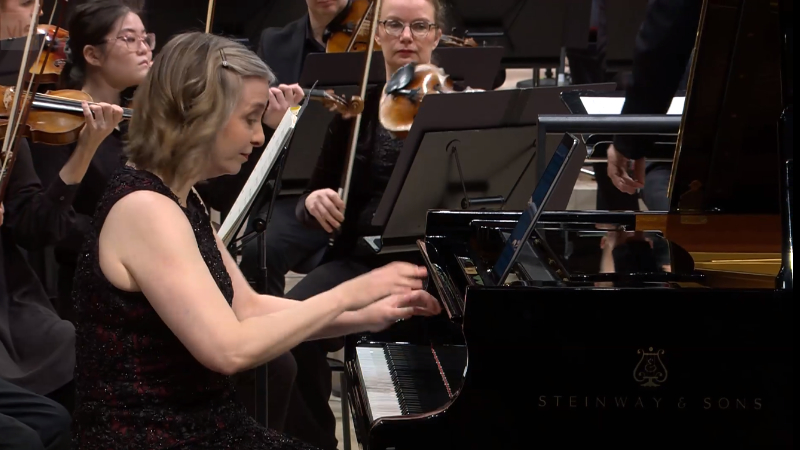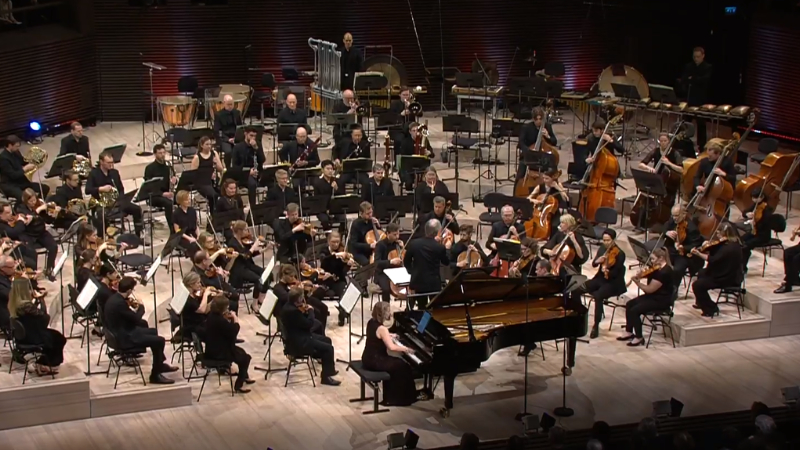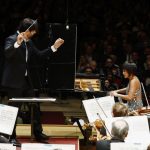January 27, 2023
The Helsinki Music Centre, Concert Hall*
Helsinki, Finland
David Robertson, conductor; Orli Shaham, piano.
György LIGETI: San Francisco Polyphony
John ADAMS: Must the devil have all the good tunes?
Sergei RACHMANINOFF: Symphony No. 1 in D Minor, Op. 13
*reviewed via live-stream video
Mark Gresham | 2 FEB 2023
With this intriguing concert program of Ligeti, Adams, and Rachmaninoff, the Finnish Radio Symphony Orchestra, conducted by David Robertson and with his wife, pianist Orli Shaham, presented to the Helsinki public a sparkling and highly eventful evening full of excellent music and great energy.
Both conductor and pianist possess a rare quality of spontaneous music-making, which is so uncommon to find today. They seem to enjoy every moment of making music and easily transmit this joy to the audience.
The concert started with a relatively short score by György Ligeti (1923-2006) called San Francisco Polyphony, written in 1973-74 to celebrate the sixtieth birthday of the San Francisco Symphony Orchestra. The composer explains, “this is neither symphony nor concerto, so the name Polyphony seems appropriate to me for this score.”
This highly spectacular piece of music is excellently orchestrated, and, despite its not-easy-to-follow structure, it catches the listener into a sort of a spider-woven construction, where single themes are hard to distinguish but change so rapidly that even the most spoiled concertgoer can never complain about boredom.
The score is also devilishly tricky from the rhythmical point of view, a real feast for the wonderful FRSO. The big woodwind and brass sections were especially precise, well in tune, and impeccable in ensemble playing.
After a short intermission, the piano concerto of John Adams (1947-) called Must the Devil Have All the Good Tunes? followed. This strange title, it seems, comes directly from Martin Luther.
This three-movement work (1. “Gritty, funky but in strict Tempo, Twitchy, Bot-like,” 2. “Much slower, Gently, Relaxed,” 3. “Più mosso, Obsession/Swing”), is a real treat for the pianist, with its breathtaking rhythmical changes and the necessity to be absolutely on time in order to give way in the most complicated situations to the orchestra, which must fill in. One can vividly see the need for more than usual rehearsal time, which this performance definitely had. It is still a real “tour de force” for the conductor, in some ways resembling the most feared Rite of spring of Stravinsky.
The slow movement, with all its apparently simple musical material, was just another moment where the touch array of Ms. Shaham emerged.
After an outburst of enthusiastic applause from the public, the pianist played an encore, a Prelude of Johann Sebastian Bach, in a transcription by the Ukrainian composer Alexander Siloti.

Pianist Orli Shaham, performing John Adams’ “Why must the devil have all the good tunes?” by John adams, wit the Finnish Radio Symphony Orchestra, conducted by David Robertson. (FRSO)
The last part of the concert was fully dedicated to the most unfortunate Symphony No. 1 in D minor, Op. 13, by Sergei Rachmaninoff (1873-1943).
The composer, at that time only 24 years old, experienced one of his most tragic failures during the premiere in Saint Petersburg. Disturbed by the unusual structure of this score, by many imprecisions of the orchestra, and by the less-than-precise conducting of a drunken Alexander Glazunov, the public vigorously contested this work, making the poor composer leave the hall even before the end of the concert and putting Rachmaninoff in a state of what we today probably would call burnout, which lasted for more than three years.
It was only through the helpful hypnotic sessions of a German psychiatrist that Rachmaninoff reacquired his capacity to compose, play and conduct again.
The score got lost and was reconstructed from the single instrumental parts only after the composer’s death in 1944. Since then, it has been played quite often, despite the fact that the structure of this work is not so typically “Rachmaninoff style.”
The four movements, “Grave-Allegro ma non troppo,” “Allegro animato,” “Larghetto,” and “Allegro con fuoco,” were presented in a sparkling rendition, following very quick tempi choices, but in absolute precision of individual orchestra components.
If the wind section was the protagonist in the two precedent scores, here it was the not-so-numerous string section to assure the necessary power and a very characteristic sound cohesion only a few orchestras in the world can display.
This program, offered to the numerous music lovers of Finland, was definitely of very high quality, comprehensive of an extraordinary video recording, which nowadays is very rare to see. ■
• As of publication time, the concert remains available for viewing on-demand at areena.yle.fi

The Finnish Radio Symphony Orchestra (Radion sinfoniaorkesteri) with pianist Orli Shaham and conductor David Robertson. (FRSO)
EXTERNAL LINKS:
- Finnish Radio Symphony Orchestra [en]: yle.fi/aihe/rso-english
- David Robertson: conductordavidrobertson.com
- Orli Shaham: orlishaham.com

Read more by Giorgio Koukl.
RECENT POSTS
 Domingo Hindoyan leads Boston Symphony in fearless Bernstein, Prokofiev, and Copland, pianist Yuja Wang solos with brilliance • 28 Oct 2025
Domingo Hindoyan leads Boston Symphony in fearless Bernstein, Prokofiev, and Copland, pianist Yuja Wang solos with brilliance • 28 Oct 2025 Conductor Arthur Fagen earns strong Italian press for Mozart’s ‘Don Giovanni’ in Jesi and Novara • 27 Oct 2025
Conductor Arthur Fagen earns strong Italian press for Mozart’s ‘Don Giovanni’ in Jesi and Novara • 27 Oct 2025




.png)